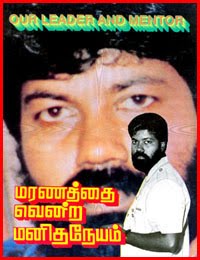A Patriot Moulded in Anti-Imperialism
A. Raghavan, Chief of Delhi Bureau, BLITZ
It was shocking that he died so young. But what elevated my spirit when I read the news was a surge of memory that so many social reformers and revolutionaries died so young.
I had the privilege of meeting Comrade Pathmanabha a couple of times in our office. His colleagues used to communicate to us what was topical about the Eelam struggle. Nabha, a man of few words. spoke seldom, only when he must to stress a point. As a journalist I had noticed the same taciturnity among some of those engaged in the Telengana armed struggle.
As a student he took the same route as some of the radical Indian leaders with whom I am familiar. To London for study and then back to the barrack, not to any berth, generally longed for by the middle classes.
Tamil Eelam was very dear to Comrade Pathmanabha but I found in him not a trace of pan-Tamil racialism. Nor was he an India baiter as some other Eelam leaders have been. As a patriot moulded in anti-imperialism, he could visualise and fight for a Tamil setup in a larger framework. On this he differed from many of his contemporaries. I imagine that it was for this crucial difference of approach towards a Tamil homeland Nabha had to die at the hands of chauvinists of both Sri Lanka and Tamil Nadu. Even a single meeting with him will convince anybody that Pathmanabha, who headed a fighting organisation like the EPRLF, was very modest in his personal behaviour and extremely unassuming. So it was no surprise to me that when the North-Eastern provincial council was formed he declined the offer of its chief ministership.
I am convinced that the Tamils fighting for a place under the sun in Sri Lanka will finally accept Comrade Pathmanabha’s perspective. In that event his martyrdom may not have gone in vain.

